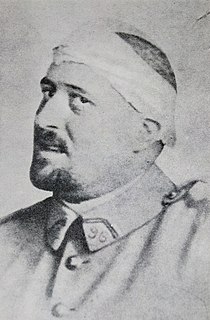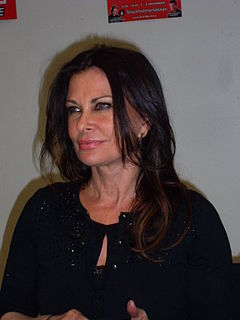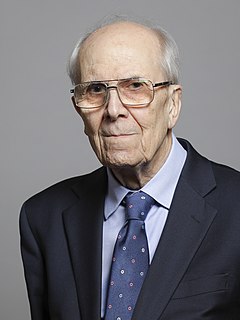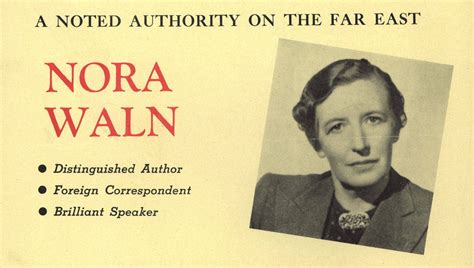Top 470 Grammar Quotes & Sayings - Page 8
Explore popular Grammar quotes.
Last updated on April 21, 2025.
The words are strung together, with their own special grammar-the laws of quantum theory-to form sentences, which are molecules. Soon we have books, entire libraries, made out of molecular "sentences." The universe is like a library in which the words are atoms. Just look at what has been written with these hundred words! Our own bodies are books in that library, specified by the organization of molecules-but the universe and literature are organizations of identical, interchangeable objects; they are information systems.
Something that had an enormous influence over my relationship with language was my stammer. I had a really bad stammer in my childhood and adolescence, and that imbues you with two things. First, a hyper-sensitivity to grammar, because a stammerer will have problematic sounds, impossible verbal stumbling blocks. Second, writing is just such a joy when you have a problem with speaking. It's so astonishing to watch language coming out of your pen without any hesitation or dysfluency.
My fascination with images open 24 hrs. is based on the complex interlocking if disparate facts heated pool that have no respect for grammar. The form then Denver 39 is second hand to nothing. The work then has a chance to electric service become its own cliché. Luggage. This is the inevitable fate fair ground of any inanimate object freightways by this I mean anything that does not have inconsistency as a possibility built in.
The new painters do not propose, any more than did their predecessors, to be geometers. But it may be said that geometry is to the plastic arts what grammar is to the art of the writer. Today, scholars no longer limit themselves to the three dimensions of Euclid. The painters have been lead quite naturally, one might say by intuition, to preoccupy themselves with the new possibilities of spatial measurement which, in the language of the modern studios, are designated by the term fourth dimension.
English grammar is so complex and confusing for the one very simple reason that its rules and terminology are based on Latin - a language with which it has precious little in common. In Latin, to take one example, it is not possible to split an infinitive. So in English, the early authorities decided, it should not be possible to split an infinitive either. But there is no reason why we shouldn't, any more than we should forsake instant coffee and air travel because they weren't available to the Romans.
And so I began to read,' Sorkar said. 'And at first the complete works were like a jungle, the language was quicksand. Metaphors turned beneath my feet and became biting snakes, similes fled from my grasp like frightened deer, taking all meaning with them. All was alien, and amidst the hanging, entangling creepers of this foreign grammar, all sound became a cacophany. I feared for myself, for my health and sanity, but then I thought of my purpose, of where I was and who I was, of pain and I pressed on.
What I had thought were signs of a broken educational system - the seemingly random placement of commas, the spastic syntax, the obnoxious overuse of quotation marks, the goofy misspelling of 'Jouralism' - were actually signs of the New Instantaneousness. 'Instant Jouralists' cannot be concerned with punctuation and grammar and spelling. That stuff just 'slows you down.' To be an 'Instant Jouralist,' you have to write as if you were being pursued by a cheetah across the Serengeti.
Although our grammar schools are teaching a whole generation computer language to adjust to the technological needs of a Stage II [post survival-focused] society, we have neglected to teach this generation relationship language and conflict resolution skills to address the social and psychological needs of a Stage II society. And when it is taught, in countries like Germany, although called social competence it focuses on workplace teamwork - still on survival, breadwinner oriented work goals.
What I want is to talk about how someone raised Muslim struggles with the same stuff that everyone else theoretically could. Obviously, the particulars are different, but everybody can sympathize with being forced to answer for their identity, the colour of their skin or their religion. A lot of people struggle with mental illness or romance or failed marriages - these are all parts of my own struggle. I read them through the lens of Islam because that's the particular language I grew up in, but the grammar is universal.
I'm thinking about the idea of poetic license. People say that about certain writers: "Oh, the grammar sucks, but it's just the poetic license." We accept it as being an art form of sorts: the incorrect rearrangement of meaningful things. Unlike sciences, literature as art relies on societal acceptance of a certain vocabulary. We're just making sounds out of our mouths if we don't both accept that what I'm saying has very significant meanings, and I'm accurately targeting what vocabulary I use and how I arrange each word.
And fantasy it was, for we were not strong, only aggressive; we were not free, merely licensed; we were not compassionate, we were polite; not good, but well behaved. We courted death in order to call ourselves brave, and hid like thieves from life. We substituted good grammar for intellect; we switched habits to simulate maturity; we rearranged lies and called it truth, seeing in the new pattern of an old idea the Revelation and the Word.
UG [universal grammar] may be regarded as a characterization of the genetically determined language faculty. One may think of thisfaculty as a 'language acquisition device,' an innate component of the human mind that yields a particular language through interaction with present experience, a device that converts experience into a system of knowledge attained: knowledge of one or another language.
The truth was I'd given up waiting long ago. The moment had passed, the door between the lives we could have led and the lives we led had shut in our faces. Or better to say, in my face. Grammar of my life: as a rule of thumb, wherever there appears a plural, correct for singular. Should I ever let slip a royal We, put me out of my misery with a swift blow to the head.
For most of us the rules of English grammar are at best a dimly remembered thing. But even for those who make the rules, grammatical correctitude sometimes proves easier to urge than to achieve. Among the errors cited in this book are a number committed by some of the leading authorities of this century. If men such as Fowler and Bernstein and Quirk and Howard cannot always get their English right, is it reasonable to expect the rest of us to?
I have declared again and again that if I say Aryans, I mean neither blood nor bones, nor hair nor skull; I mean simply those who speak an Aryan language. In that sense, and in that sense only, do I say that even the blackest Hindus represent an earlier stage of Aryan speech and thought than the fairest Scandinavians. To me an ethnologist who speaks of Aryan race, Aryan blood, Aryan eyes and hair, is as great a sinner as a linguist who speaks of a dolichocephalic dictionary or a brachycephalic grammar.
Nothing could go wrong because nothing had...I meant "nothing would." No - Then I quit trying to phrase it, realizing that if time travel ever became widespread, English grammar was going to have to add a whole new set of tenses to describe reflexive situations - conjugations that would make the French literary tenses and the Latin historical tenses look simple.
When I hear the hypercritical quarreling about grammar and style, the position of the particles, etc., etc., stretching or contracting every speaker to certain rules of theirs. I see that they forget that the first requisite and rule is that expression shall be vital and natural, as much as the voice of a brute or an interjection: first of all, mother tongue; and last of all, artificial or father tongue. Essentially your truest poetic sentence is as free and lawless as a lamb's bleat.
Lying is the misuse of language. We know that. We need to remember that it works the other way round too. Even with the best intentions, language misused, language used stupidly, carelessly, brutally, language used wrongly, breeds lies, half-truths, confusion. In that sense you can say that grammar is morality. And it is in that sense that I say a writer's first duty is to use language well.
The first is that good writing consists of mastering the fundamentals (vocabulary, grammar, the elements of style) and then filling the third level of your toolbox with the right instruments. The second is that while it is impossible to make a competent writer out of a bad writer, and while is equally impossible to make a great writer out of a good one, it is possible, with lots of hard work, dedication, and timely help, to make a good writer out of a merely competent one
"Elohim," the name for the creative power in Genesis, is a female plural, a fact that generations of learned rabbis and Christian theologians have all explained as merely grammatical convention. The King James and most other Bibles translate it as "God," but if you take the grammar literally, it seems to mean "goddesses." Al Shaddai, god of battles, appears later, and YHWH, mispronounced Jehovah, later still.
I think, as human beings, we all have a fundamental mode, a basic way of relating to the rest of reality, and for me, it's always instinctively been about sound making and trying to extract information, grammar, meaning from sound making. That's been my way of navigating reality that's very personal; a painter might say they make marks or look.
I grew up in a family of educators - my dad was a professor, my mom was a high school grammar and French teacher - so certainly my entire life education was stressed as incredibly important. And I think especially for my parents, who are both immigrants, and when immigrants come to this country, they understand that education is something that no one can take from them. You might leave the country with absolutely nothing, but no one can take your education from you.
When I'm asked to define "Southern food," I usually turn that question back to my audience and ask them what they think. I hear responses like fried chicken, catfish, barbecue, collard greens, and sweet potatoes. These are excellent examples, because they are historically grounded. You can trace each dish back to the people who brought these food traditions to the South. Today, these foods are central to the core culinary grammar of the American South.
I think the most important work that is going on has to do with the search for very general and abstract features of what is sometimes called universal grammar: general properties of language that reflect a kind of biological necessity rather than logical necessity; that is, properties of language that are not logically necessary for such a system but which are essential invariant properties of human language and are known without learning. We know these properties but we don't learn them. We simply use our knowledge of these properties as the basis for learning.
She was, in fact, quite a pleasant looking girl, even if her bosom had clearly been intended for a girl two feet taller; but she was not Her. The Egregious Professor of Grammar and Usage would have corrected this to "she was not she," which would have caused the Professor of Logic to spit out his drink.
One of the reasons I love language is that concerning semiotics, language is an arbitrary sign system, which means the signs within it are free-floating, but we put them in a certain order to get them to have meaning for us. If we left them alone, they'd be like water, like the ocean. It would be just this vast field of free-floating matter or signs, so in this way, I think language and water have much in common. It's only us bringing grammar and syntax and diction and the human need for meaning that orders language, hierarchizes it.
Stories are there to be told, and each story changes with the telling. Time changes them. Logic changes them. Grammar changes them. History changes them. Each story is shifted side-ways by each day that unfolds. Nothing ends. The only thing that matters, as Faulkner once put it, is the human heart in conflict with itself. At the heart of all this is the possibility, or desire, to create a piece of art that talks to the human instinct for recovery and joy.
I love Soul, R+B, Electronic, and good pop. Really, the only thing I don't listen to is country and heavy metal. I love Marvin Gaye, John Legend, Al Green, Fat Freddys Drop, Sade, Grace Jones, Bazoo Bijou, Prince, John Lennon, London Grammar, Daft Punk, Dr John, Dusty Springfield, Peggy Lee, Gotye, and on it goes.
It's a weird partnership. For me and Patrick, if you've met him, we're not very much alike. But we bring such different tools to the table. He doesn't think like me. I don't think like him. He thinks like an editor. He thinks like a director. He thinks completely outside of the box when it comes to writing and so because of that he leads me down roads that I would've never gone down. And he sucks at grammar. So together we're perfect.
In high school, in 1956, at the age of sixteen, we were not taught "creative writing." We were taught literature and grammar. So no one ever told me I couldn't write both prose and poetry, and I started out writing all the things I still write: poetry, prose fiction - which took me longer to get published - and non-fiction prose.
There was this wonderful day where we sat and listened to all of Andy's [Kim] songs throughout the years, and I think we spent around six hours at my house, and then we played all these tunes of mine that have never found any version. And "Heaven Without a Gun" is one of them, and it struck him. If you can find a compadre who doesn't live in the literal world 'cos you're not always fighting to explain yourself to make sense, that maybe it's the dyslexia, maybe it's the dreamer, maybe it's the idea that grammar was not your foreplay - excuse me - see what I mean, your forte.
I used to think things were the way they are for a reason, that there was some hidden meaning. I used to think that this meaning governed the way the world was. But it's an illusion to think that there are good and bad reasons. Grammar is a lie to make us think that what we say is connected by a logic that you'll find if you study it, a lie that gone on for centuries. Because I now know that life just lurches between stability and instability and doesn't obey any law.
In the most basic way, writers are defined not by the stories they tell, or their politics, or their gender, or their race, but by the words they use. Writing begins with language, and it is in that initial choosing, as one sifts through the wayward lushness of our wonderful mongrel English, that choice of vocabulary and grammar and tone, the selection on the palette, that determines who's sitting at that desk. Language creates the writer's attitude toward the particular story he's decided to tell.
All the arguments there are against Malcolm [Turnbull] - and there are many - the one thing in which he is impeccable and why I would support him in this is that he has an absolutely impeccable record on the question of colour and race. People often wondered why. What I see as a possible explanation is [that] he came from a very wealthy family - a 'squattocracy' - and he had private education at home and then he went to boarding school at Melbourne Grammar School, one of those lead schools in Australia.
Next, to make them expert in the usefullest points of grammar; and withal to season them and win them early to the love of virtue and true labour, ere any flattering seducement or vain principle seize them wandering, some easy and delightful book of education would be read to them; whereof the Greeks have store, as Cebes, Plutarch, and other Socratic discourses.
Certain individual words do possess more pitch, more radiance, more shazam! than others, but it's the way words are juxtaposed with other words in a phrase or sentence that can create magic. Perhaps literally. The word "grammar," like its sister word "glamour," is actually derived from an old Scottish word that meant "sorcery." When we were made to diagram sentences in high school, we were unwittingly being instructed in syntax sorcery, in wizardry. We were all enrolled at Hogwarts. Who knew?
Must you write complete sentences each time, every time? Perish the thought. If your work consists only of fragments and floating clauses, the Grammar Police aren't going to come and take you away. Even William Strunk, that Mussolini of rhetoric, recognized the delicious pliability of language. "It is an old observation," he writes, "that the best writers sometimes disregard the rules of rhetoric." Yet he goes on to add this thought, which I urge you to consider: "Unless he is certain of doing well, [the writer] will probably do best to follow the rules."
The thing is that I am a member of that sad, ever-dwindling minority... the child of an unbroken home. I have carried this albatross since the age of eleven, when I started at grammar school. Not a day would pass without somebody I knew turning out to be adopted or illegitimate, or to have mothers who were about to hare off with some bloke, or to have dead fathers and shabby stepfathers. What busy lives they led. How I envied their excuses for introspection, their ear-marked receptacles for every just antagonism and noble loyalty.
Once, BBC television had echoed BBC radio in being a haven for standard English pronunciation. Then regional accents came in: a democratic plus. Then slipshod usage came in: an egalitarian minus. By now slovenly grammar is even more rife on the BBC channels than on ITV. In this regard a decline can be clearly charted... If the BBC, once the guardian of the English language, has now become its most implacable enemy, let us at least be grateful when the massacre is carried out with style.
I think that people don't make the most of their lives. So, you know, for me, it seems like it's the beginning of me rattling the cage, of making some people nervous. And people are strategically trying to do things to mute my voice in some way or make me look like I'm a lunatic or pinpoint the inaccuracies in my grammar to somehow take away from the overall message of what I'm saying.
Bad art was as good as good art. Grammar and spelling were no longer important. To be clean was no better than to be filthy. Good manners were no better than bad. Family life was derided as an outdated bourgeois concept. Criminals deserved as much sympathy as their victims. Many homes and classrooms became disorderly - if there was neither right nor wrong there could be no basis for punishment or reward. Violence and soft pornography became accepted in the media. Thus was sown the wind, and we are now reaping the whirlwind.
Many musicians are fabulously skilled at playing the black dots on the printed page, but mystified by how the dots got there in the first place and apprehensive of playing without dots. Music theory does not help here; it teaches rules of the grammar, but not what to say. When people ask me how to improvise, only a little of what I can say is about music. The real story is about spontaneous expression, and it is therefore a spiritual and a psychological story rather than a story about the technique of one art form or another.
[Malcolm Fraser] went straight from Melbourne Grammar to Oxford. And he would have been a very lonely person, and I think he probably met a lot of black students there who were also probably lonely. I think he formed friendships with them, which established his judgement about the question of colour. That’s my theory. I don’t know whether it’s right or not, but that’s what I always respected about Malcolm. He was absolutely, totally impeccable on the question of race and colour.
Although mathematical notation undoubtedly possesses parsing rules, they are rather loose, sometimes contradictory, and seldom clearly stated. [...] The proliferation of programming languages shows no more uniformity than mathematics. Nevertheless, programming languages do bring a different perspective. [...] Because of their application to a broad range of topics, their strict grammar, and their strict interpretation, programming languages can provide new insights into mathematical notation.
Colonialism is a terrible bane for a people upon whom it is imposed, but a blessing for a language. English's drive to exploit the new and the alien, its zeal in robbing words from other languages, its incapacity to feel qualms over the matter, its museum-size overabundance of vocabulary, it shoulder-shrug approach to spelling, its don't-worry-be-happy concern for grammar-the result was a language whose colour and wealth Henry loved.
Time in China has no immediacy as in America. Here I find the swift passage of our few earthly years accepted as naturally as the fall of flower and leaf. ... I hear and speak a language in which grammar has no tense. Both scholars and illiterates, in ordinary daily speech, tell an event of centuries ago as casually as an incident of the hour. Only as my knowledge has accumulated have I been able to know whether something related happened just then or in some past dynasty.
when Christian theology becomes traditionalism and men fail to hold and use it as they do a living language, it becomes an obstacle, not a help to religious conviction. To the greatest of the early Fathers and the great scholastics theology was a language which, like all language, had a grammar and a vocabulary from the past, but which they used to express all the knowledge and experience of their own time as well.
It seems a miracle that young children easily learn the language of any environment into which they were born. The generative approach to grammar, pioneered by Chomsky, argues that this is only explicable if certain deep, universal features of this competence are innate characteristics of the human brain. Biologically speaking, this hypothesis of an inheritable capability to learn any language means that it must somehow be encoded in the DNA of our chromosomes. Should this hypothesis one day be verified, then lingusitics would become a branch of biology.













































